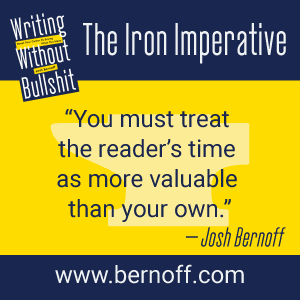Responding to objections to “Writing Without Bullshit”

A lot of people think my writing advice is wrong. When you apply the principles in my book at work, you’re going to encounter resistance, because the way I teach writing is not conventional. Here’s a set of objections and counterarguments for when people tell you you’re doing it wrong.
Business writing has worked fine for many decades. Why change?
Actually, business writing has been failing and driving people crazy for many decades. As William Zinsser wrote in 1976, “We are a society strangling in unnecessary words, circular constructions, pompous frills, and meaningless jargon.” What’s changed is that we read everything on a screen now. That makes it hard to concentrate, and demands a more brief, pointed writing style.
“We do it this way because we’ve always done it this way,” is a dumb argument. Things have changed. You need to change in response. Unless you’re still using typewriters and carbon paper, of course.
Writing is obsolete. Video is where it’s at.
Right. We’re all going to communicate by sending videos to each other all day. No, businesspeople still need to communicate by writing. Whether it’s an email, a text message, or a report, you need to write well to succeed.
You’re taking all the joy and poetry out of writing.
The purpose of media is to entertain and retain your attention. That’s why newspapers write “stories.” And that’s fine, if you’re writing for media.
The purpose of business writing is to make a change in the reader. That is its only purpose. People don’t have time for entertainment. They want to make decisions; you need to help them.
My stylistic recommendations — to write brief, front-loaded text and avoid jargon, passive voice and weasel words, for example — leave plenty of room for art. You can still tell a story with facts and bullet points. Just don’t wax rhapsodic, you’ll lose your audience. (See, I just used “rhapsodic” in a business communication. So don’t tell me I’ve taken the joy out of it.)
 It’s too much work to write the way you say.
It’s too much work to write the way you say.
Take a close look at that argument, because it really says “Let’s put the onus on the reader to figure things out, rather than doing our job as writers and helping readers get meaning.”
Yes. It’s work to edit yourself. It’s work to rewrite what you wrote. It’s work to create graphics. It’s work to learn to give up bad habits like meandering sentences in favor of bullet points and subheads. But once you learn those things, it’s actually easier to write that way. Because when you sit down to write, you will know exactly what to do.
Treat the reader’s time as more valuable than your own.
Stories have a beginning, middle, and end. You want me to start at the end.
Read a news story in the paper. It has a lede. The title and the first few sentences tell you what it’s about. That doesn’t stop them from telling their story in the rest of the article. That’s all I want you to do. You can tell a story, but before the beginning, tell me what to expect. Spoiler alerts are for movie reviews, not business communication.
Passive voice is fine.
There are cases where passive voice is fine. My problem is that people use it habitually, repeatedly, and thoughtlessly. It is not passive voice that ruins business writing; it is the mindless repetition of passives. If you can examine each use of passive in your document and tell me it is the best way to write what you are writing — that you have considered an active construction and rejected it — then go ahead and use it. But I think you’ll find that rethinking what you’re saying, and then rewriting it in active voice, will make your writing easier to understand.
Jargon is fine
Why are you using jargon? To help readers, or to puff yourself up? Jargon confuses far more often than it impresses.
For each jargon word, ask, “Do I understand what this means? And do most of my readers understand as well?” Unless you can answer both of those questions in the affirmative, then rewrite what you’ve written with words that normal people use in conversation.
Your list of weasel words to eliminate is too onerous. Very? Most? C’mon.
My advice is the same as for passives. It’s not the weasel words that kill, it’s the repetition. Cut as many as you can.
 I’m more comfortable writing in paragraphs than bullets and subheads
I’m more comfortable writing in paragraphs than bullets and subheads
You learned that in school. It’s obsolete. When you’re reading something in business, it’s a lot easier to scan it first. That means you need to reveal the structure. You’re not writing college papers any more. Your colleagues, managers, and customers will appreciate communication that they can comprehend quickly.
The rest of my organization doesn’t understand this way of communicating
Then teach them. They’re “but-heads” — they have excuses for everything. Create change, don’t just give up.
I’m a millennial. We communicate differently. You should learn from us, not the other way around.
With all due respect, you didn’t invent communication. But a lot of you have twigged to a better way to write, which is brief, pointed, and conversational. You know, like a Facebook post or a text message.
Now take those skills and use them to succeed in a world that’s not run by millennials (yet). With a little discipline, those instincts will turn into clear and brief messages in the workplace. You’ll find this easier to learn than your older colleagues will.
I notice the common theme in all of those is “I don’t want to change” and/or “I don’t want to admit I’m wrong.”
A valid criticism would be “Your way is less effective”…but I can almost guarantee you’ll never hear that one.
Zinsser’s advice is more needed today more than ever. Glad to see someone picking up the torch.
…and just realized I used “more” twice in the same sentence. Got to love our ability to see our mistakes immediately after hitting “post.”
You blog is the most important blog that I read, and I read it more than any other. Perhaps all of the objections you get are coming from professional business writers out there with an ax to grind, but your blog has helped me—NOT a professional business writer—to improve my writing skills. And there is a lot of room for improvement. I own a small advertising and design business and I write a range of things from copy for ads to boring but important manuals for brand identity standards. I do work with editors whenever I can afford them but many of my clients are non-profits that are seriously bottom line conscious. So many times I’ve looked at something that I’ve written and thought, “Okay this sucks, but why does it suck?” It is never as obvious to me as it could be. Then I came across your blog last Spring. Your iron imperative (that may not be what you named it… I’m writing from memory here), warnings about weasel words and the really informative critiques you provide (at no cost people, c’mon!) have all been *helpful for me to guide my own writing. I know you aren’t fishing for compliments, but I thought it might be helpful for you to hear from someone who appreciates what you are doing. Thanks! Now I need to buy your damn book.
(*I had to struggle with not saying “very helpful” there)
Thanks. You’ve made my night.
No axe from this professional writer! I fight this battle with many clients who are convinced that their convoluted writing makes them sound smart.
Tell your critics GFY. Or does that count as jargon? 🙂